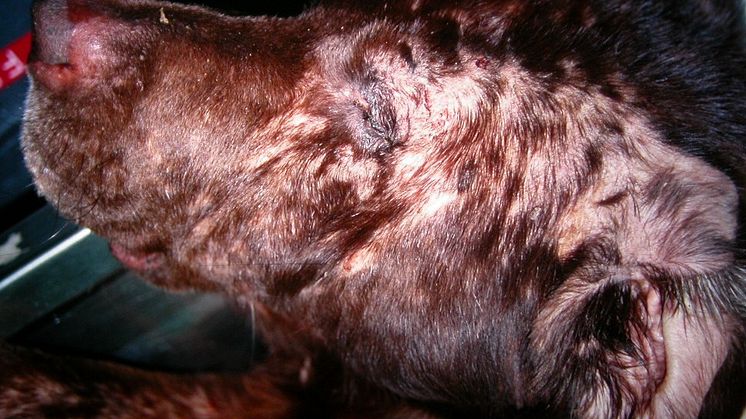Press release -
Second gene modifies effect of mutation in DM, a dog model of ALS
Canine Degenerative Myelopathy (DM) is a neurodegenerative disease in dogs with similarities to ALS in humans. Scientists at Uppsala University, SciLifeLab, the Broad Institute of MIT and Harvard, and the University of Missouri, have discovered a modifier gene that affects the risk of developing DM in Pembroke Welsh Corgis. The study is published in PNAS this week.
Degenerative Myelopathy is a naturally occurring, progressive adult onset disorder of the spinal cord that leads to paralysis and death. In 2009, a SOD1 mutation was associated with risk of developing the disease (link to previous press release). However, not all dogs with the mutation became affected, prompting the hypothesis that additional genes could modify disease risk.
Genome-wide association analysis comparing affected and unaffected PWC with the SOD1 mutation identified a haplotype within the gene ‘SP110 nuclear body protein’ that was associated with increased risk of developing DM and early age of onset.
- We discovered several variants in SP110 that were more common in the PWCs that developed DM says Emma Ivansson, former PostDoc at Uppsala University leading the study.
- Our functional studies revealed that the variants alter expression of SP110 in blood cells continues Sergey Kozyrev, senior scientist at Uppsala University.
- Whether SP110 affects the risk of DM also in other dog breeds requires further investigation, says Kate Megquier, veterinarian and PhD student at Uppsala University and Broad Institute.
SP110 is a regulator of gene expression, mainly in immune cells. It is known that the immune response is important in neurodegeneration, but inflammation can be either protective or damaging and the exact mechanisms are still unclear.
- Many studies have investigated the role of immunity in ALS, and our finding that a gene regulating the immune response is important in this canine model of ALS could provide a new angle says Emma Ivansson.
Reference: PNAS, online Early Edition the week of May 16-May 20 2016. Variants within the SP110 nuclear body protein modify risk of canine degenerative myelopathy. K. Lindblad-Toh et al.
Reference initial study when SOD1 mutation was discovered:
Proc Natl Acad Sci U S A. 2009 Feb 24;106(8):2794-9. doi: 10.1073/pnas.0812297106. Epub 2009 Feb 2.
Genome-wide association analysis reveals a SOD1 mutation in canine degenerative myelopathy that resembles amyotrophic lateral sclerosis.
Awano T1, Johnson GS, Wade CM, Katz ML, Johnson GC, Taylor JF, Perloski M, Biagi T, Baranowska I, Long S, March PA, Olby NJ, Shelton GD, Khan S, O'Brien DP, Lindblad-Toh K, Coates JR.
Contact information
Emma Ivansson +46 733-329972 emma.ivansson@ki.se
Kate Megquier +001 617-714-8919 kmegq@broadinstitute.org
Science for Life Laboratory (SciLifeLab) is a Swedish national centre for molecular biosciences with the focus on health and environmental research. The centre combines advanced technical know-how and state-of-the art equipment with a broad knowledge of translational medicine and molecular bioscience.
Topics
Uppsala University -- quality, knowledge, and creativity since 1477
World-class research and outstanding education of global benefit to society, business, and culture.
Uppsala University is one of northern Europe's highest ranked academic institutions. www.uu.se

